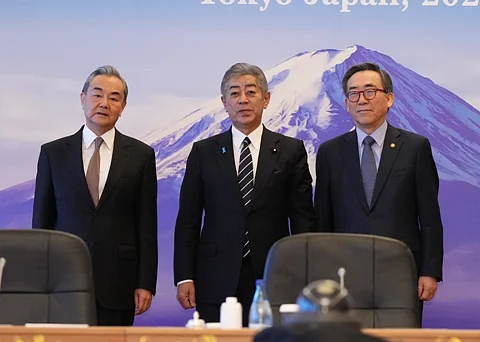

Foreign ministers from Japan, China, and South Korea convened in Tokyo on Saturday to discuss enhanced cooperation on trade, regional security, and other pressing issues, as geopolitical tensions continue to escalate in the region. The meeting, held among three neighbors with a history of strained relations and territorial disputes, comes at a critical juncture marked by U.S. President Donald Trump’s threats of trade tariffs and growing regional instability.
A Turning Point for Regional Collaboration
Japanese Foreign Minister Takeshi Iwaya, Chinese Foreign Minister Wang Yi, and South Korean Foreign Minister Cho Tae-yul emphasized the importance of addressing long-standing challenges to foster broader support for cooperation. Speaking at a joint press conference, Iwaya described the current international climate as increasingly severe, suggesting that the region may be at a historic turning point.
"Given the increasingly severe international situation, I believe we may truly be at a turning point in history," Iwaya said. "It has become more important than ever to make efforts to overcome division and confrontation through dialogue and cooperation."
Wang Yi echoed this sentiment, noting that 2023 marks the 80th anniversary of the end of World War II. He stressed the importance of confronting history honestly to build a better future. "Strengthening East Asian cooperation would allow the three countries to jointly resist risks and promote mutual understanding between their peoples," Wang said.
South Korea’s Cho Tae-yul highlighted the symbolic significance of the trilateral meeting, stating that their collaboration could send "a message of hope for the future to the world."
Key Issues on the Agenda
The ministers addressed a range of critical topics, including trade, the denuclearization of the Korean Peninsula, and regional security. The denuclearization goal, reaffirmed during a leaders’ summit in Seoul in May—the first such meeting in five years—remains a top priority. Cho emphasized the importance of candid discussions on North Korea’s nuclear program, stating, "The peace and security of the Korean Peninsula are essential conditions for peace and prosperity in East Asia and the world."
Cho also called for an end to military cooperation between North Korea and Russia, urging that Pyongyang not be rewarded for its actions amid the ongoing Ukraine war. He emphasized the need for Seoul, Tokyo, and Beijing to faithfully implement United Nations sanctions against North Korea. While Japan and South Korea are close U.S. allies, China remains one of North Korea’s primary international supporters, providing economic and political backing to the isolated regime.
Broader Cooperation on Global Challenges
In addition to security concerns, the ministers discussed climate change, aging populations, natural disaster preparedness, and the impact of Russia’s war in Ukraine. They also met with Japanese Prime Minister Shigeru Ishiba, who underscored the importance of "pragmatic diplomacy" in addressing these complex issues.
The diplomats expressed hope for a trilateral leaders’ summit by the end of 2025, according to Japanese public broadcaster NHK. Bilateral talks were also scheduled, including the first high-level economic dialogue between Japan and China in six years. Japan aims to resume seafood exports to China, which were halted in 2023 following the release of treated wastewater from the Fukushima nuclear power plant.
As the three nations navigate a rapidly changing geopolitical landscape, their efforts to strengthen cooperation could play a pivotal role in shaping the future of East Asia and beyond.